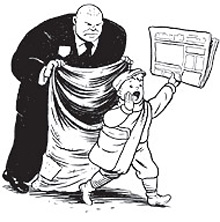 |
 |
 |
 Travel Writers' Resources | May 2006 Travel Writers' Resources | May 2006  
Scared of Scoops
 Geoffrey R. Stone - NYTimes Geoffrey R. Stone - NYTimes


| | Ross MacDonald |
While tensions between the federal government and the press are as old as the Republic itself, presidential administrations have never been inclined to criminally prosecute the news media for publishing information they would rather keep secret. In recent weeks, however, the Bush administration and its advocates, including Attorney General Alberto Gonzales, have spoken of prosecuting The Washington Post and The New York Times for publishing Pulitzer Prize-winning exposés of the administration's secret prisons in Eastern Europe and secret National Security Agency surveillance of Americans.

Specifically, the president and some of his supporters say reporters and publishers have violated a provision of the 1917 Espionage Act, which provides in part that anyone in unauthorized possession "of information relating to the national defense, which information the possessor has reason to believe could be used to the injury of the United States" who willfully communicates it to any person not entitled to receive it "shall be fined under this title or imprisoned not more than 10 years, or both."

But for at least three reasons, such threats are largely empty. First, the provision was never intended to be used against the press. When the Espionage Act was proposed by President Woodrow Wilson, it included a section that would expressly have made it a crime for the press to publish information that the president had declared to be "of such character that it is or might be useful to the enemy." Congress overwhelmingly rejected that proposal, with members of both parties characterizing it as "un-American" and "an instrument of tyranny."

Second, if the 1917 act were meant to apply to journalists, it would unquestionably violate the First Amendment. Laws regulating speech must be precisely tailored to prohibit only speech that may constitutionally be proscribed. This requirement addresses the concern that overbroad laws will chill the willingness of individuals to speak freely.

Not surprisingly, because the act was drafted before the Supreme Court had ever interpreted the First Amendment in a relevant manner, it does not incorporate any of the safeguards the court has since held the Constitution requires. For example, the provision of the act is not limited only to published accounts that pose a "clear and present danger" to the nation. For this reason, it seems clear, any prosecution of the press under it would be dismissed out of hand by the judiciary.

Third, if Congress today enacted legislation that incorporated the requirements of the First Amendment, it could not apply to articles like those published by The Times and The Post. Such a statute would have to be limited to articles that, first, do not disclose information of legitimate and important public interest and, second, pose a clear and present danger. Nobody could deny that articles like those on secret prisons and electronic surveillance of Americans clearly concerned matters of legitimate and important public interest; nor could the administration show that such disclosures created a clear and present danger of serious harm to the national security.

I do not mean to suggest that the government has no interest in keeping military secrets or that it may never punish the press for disclosing classified information. To the contrary, the government may take many steps to keep such information secret, including (in appropriate circumstances) firing and even prosecuting public employees who unlawfully leak such information.

Moreover, in narrowly defined circumstances, the government may prosecute the press for disclosing classified national security information. Such a prosecution might be consistent with the First Amendment, for example, if a newspaper revealed that the government had secretly broken an important Qaeda code, thus causing that group to change its cipher. But revelations like those in The Times and Post revealed significant government wrongdoing and therefore are essential to effective self-governance; they are at the very core of the First Amendment.

Although the threats of the White House are largely bluster, they must nonetheless be taken seriously. Not because newspapers are really in danger of being prosecuted, but because such intimidation is the latest step in this administration's relentless campaign to control the press and keep the American people in the dark.

Geoffrey R. Stone, a law professor at the University of Chicago, is the author of "Perilous Times: Free Speech in Wartime From the Sedition Act of 1798 to the War on Terrorism." | 
 | |
 |



